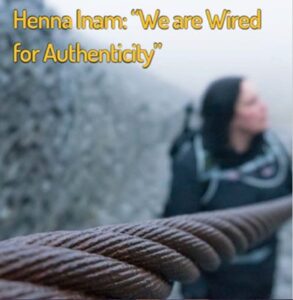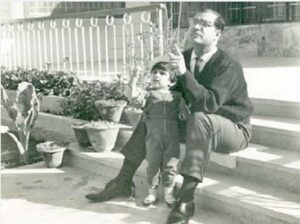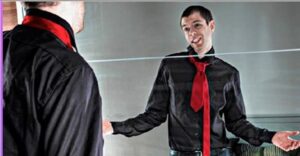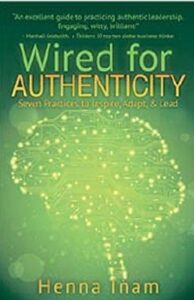 It was on a transatlantic flight, more than five years ago, that Henna Inam started to understand she had been lying to herself about who she really was. “Sure, I was happy. I was flying back from Switzerland to Mexico where I ran a branch of a multinational corporation. I was recognized for my team’s business building results, one of among ten employees in a company of 90,000. It was an amazing recognition. I had been climbing the corporate ladder for almost 20 years, working harder and harder. I had a simple formula. I believed that achievement would lead to success, which will lead to happiness. If I kept climbing, I would eventually enter Nirvana.
It was on a transatlantic flight, more than five years ago, that Henna Inam started to understand she had been lying to herself about who she really was. “Sure, I was happy. I was flying back from Switzerland to Mexico where I ran a branch of a multinational corporation. I was recognized for my team’s business building results, one of among ten employees in a company of 90,000. It was an amazing recognition. I had been climbing the corporate ladder for almost 20 years, working harder and harder. I had a simple formula. I believed that achievement would lead to success, which will lead to happiness. If I kept climbing, I would eventually enter Nirvana.
Long flights make for existentialist thoughts. I realized I was happy, just not happy-happy. It made me curious. Was this my midlife crisis? I was turning 40. But that was not it. Something was missing. I realized that a part of me was missing.”
The courage to be curious
Henna Inam did a courageous thing. Instead of silencing that nagging feeling, soldiering on, and climbing that corporate ladder, she started to search for that missing piece. “I decided to investigate what was happening. I read every fluffy personal growth book that I could find. I wanted to know everything about the self. Of course, that was awkward in the beginning. It did not feel authentic at all. My corporate finance books sat on full display in my bookcase, but the self-help books were hidden in the back because I was ashamed of that part of me that liked self-help books. After all I had created an image of myself as a hard-core Wharton Finance MBA and these two parts of myself didn’t seem to fit well together.” sat on full display in my bookcase, but the self-help books were hidden in the back because I was ashamed of that part of me that liked self-help books. After all, I had created an image of myself as a hard-core Wharton Finance MBA and these two parts of myself didn’t seem to fit well together.”
sat on full display in my bookcase, but the self-help books were hidden in the back because I was ashamed of that part of me that liked self-help books. After all, I had created an image of myself as a hard-core Wharton Finance MBA and these two parts of myself didn’t seem to fit well together.”
“Around that time I read Eat, Pray, Love by Elizabeth Gilbert. That book gave me the idea to travel to India, just like Gilbert had done. I spent ten days in an ashram in India. I wanted to find out what would make me feel fulfilled. In total, it was twenty days of meditation digging deeper into myself. I discovered I had been lying to myself. My authentic Self was so much more than my successful corporate executive role. And I understood how that had happened.”
The childhood dream
Henna was born in Pakistan. As she shows this photo, she shares: “Here’s me and my dad. He was my leadership hero when we were young. Pakistan was at war with India. We had to cover the large windows with duct tape to shut off the light and to be safe at night when there could be bombings. This framed my earliest yearnings about who I wanted to be when I grew up. I wanted to be an Air Force fighter pilot to save my people. That was my dream: to save people.”
 She continues: “Our youngest yearnings provide a great clue to who we really are, and what we are here for. As a child, we are ourselves before the world shapes us. Our identity is formed by the roles that were rewarded when we were children. But that identity can digress from who we are. As we grow, evolve, dig deeper into ourselves, we find that our fixed identities don’t serve us. ”
She continues: “Our youngest yearnings provide a great clue to who we really are, and what we are here for. As a child, we are ourselves before the world shapes us. Our identity is formed by the roles that were rewarded when we were children. But that identity can digress from who we are. As we grow, evolve, dig deeper into ourselves, we find that our fixed identities don’t serve us. ”
That is what happened to Henna, and what happens to so many of us in the process of fitting into our family, our culture, and society. Upon becoming reliable, useful adults who can provide for themselves. “I got lost,” says Henna. “I went to business school. I found myself saving people – mostly from indigestion, working for large Fortune 500 companies. I climbed the corporate ladder – until that flight when it struck me that something was missing.”
“The higher I rose on the corporate ladder, the bigger became the disconnect with what I truly wanted,” she recalls. “I sat in board meetings while I wanted to spend time with my team, and with customers. I resigned in 2010 to create a company focused on leadership development.”
Being Authentic at work
 After 20 successful years in American corporations, working all over the world, Henna Inam is the CEO of her own company since 2011. Transformational Leadership Inc. helps organizations develop authentic leaders and cultures of innovation, trust, and inclusion. It is Henna’s mission to help people be more authentic at work, and she’s excited about connecting with people around a movement for greater authenticity in the workplace (see: https://www.transformleaders.tv/be-an-authenticitywork-advocate/ )
After 20 successful years in American corporations, working all over the world, Henna Inam is the CEO of her own company since 2011. Transformational Leadership Inc. helps organizations develop authentic leaders and cultures of innovation, trust, and inclusion. It is Henna’s mission to help people be more authentic at work, and she’s excited about connecting with people around a movement for greater authenticity in the workplace (see: https://www.transformleaders.tv/be-an-authenticitywork-advocate/ )
“Employees are disengaged because we are not connected to ourselves and others. Look at the infamous Gallup data. My point is: we are wired for authenticity! We need to connect to ourselves and others.”
The latest research in neuroscience shows that authenticity is good for our health and well-being. This is why lie detectors work; they record stress levels that drive up perspiration and our heart rate. We’re wired for authenticity: we have stress if we’re not authentic.”
Also, our mirror neurons cause us to copy others quite unconsciously: we mimic behavior and feelings. Our emotions are contagious – when we let our guard down, it is likely that others will as well.
Last but not least, authentic connections with one another improve the health of the vagus nerve that connects our brain to our guts and regulates the immune system, and our cardiovascular health.
Imagine if we create environments where we can be authentic: the great impact on health that would have! The energy that would be unleashed at work when we are each able to let our guard down. To share our perspective openly, and stop being a cardboard cut-out of who we think we need to be to please others.
The Challenge of Authenticity
Right now, authenticity challenges organizations and people. It is not easy to be authentic in the workplace. How are you to be taken seriously when you love humor and jokes – but you work at a law firm? What if you are an introvert who is working in a very competitive, verbal culture? How to lay off people when you hate doing so – what would be an authentic way to do what is needed?
“Authentic leadership is the fullest expression of me for the benefit of we. But it means that we need to embrace diversity. We are all different, and that is okay.
Compare it to the body: we need one heart, one kidney, one liver, and so on. We don’t need 12 kidneys. The body works best because each organ is different. It is a great metaphor for how great teams and organizations can function.”
 Henna Inam shares seven practices to be more authentic in her book “Wired for Authenticity”. They are:
Henna Inam shares seven practices to be more authentic in her book “Wired for Authenticity”. They are:
- Befriend your body: Use intuition, posture, and breath to be more centered, emotionally intelligent
and confident. - Stay curious: Know yourself as you evolve. Who am I right now?
- Let go: What assumptions do you need to let go of?
- Give yourself an “A”: Accept yourself completely, including your flaws.
- Choose Be before Do: Who will you BE to serve the greater good in this moment?
- Face the Dragon: You may encounter fear, and you can choose courage
- Dance with the dream: What inspires you that you want to bring to work every day?
“Let me explain them with the case of Maria, one of my executive coaching clients. Maria led a team that was not
delivering the results she wanted. She wondered how to use her personal power to motivate her team. She first
started to befriend her body, a quick practice of connecting with yourself; you breathe from your belly and connect. It makes you more centered as you step into your authentic self, to get you out of being in Saboteur mode. Research shows that your body language changes your mind.
Maria also had to stay curious – who am I right now? Who is the person that is stuck with this perspective on the team?
She checked on the saboteurs that lived rent free in her head. Maria found a high-achiever saboteur; always aiming for the next goal, and even more achievement. The sabotage came from fear: “Unless I’m achieving something, I’m not worth much.”
Another saboteur of Maria’s was the pleaser. Maria needed to be honest with her team instead of being nice all the time.
Next, she developed allies: the thought patterns that help us counter our saboteurs. The “bossy boss” was an ally: she made it easier for Maria to stop being nice to please people and instead choose to be clear with people and hold them accountable.
Last but not least, we applied the practice of letting go of assumptions. Maria assumed her team was not accountable, and that she had tried everything. She was wrong. She just needed to be clear with them.
 Maria learned that accepting all parts of ourselves allows us to be more powerful. That means that you first decide who you will BE from what inspires you rather than what you fear. Let your authentic Self make that choice. When she shifted her being, her behaviors changed as did her leadership impact.”
Maria learned that accepting all parts of ourselves allows us to be more powerful. That means that you first decide who you will BE from what inspires you rather than what you fear. Let your authentic Self make that choice. When she shifted her being, her behaviors changed as did her leadership impact.”
Henna concludes: “Authenticity is a moment-by-moment choice about who we will be that best serves the greatest good.”
You can connect with Henna Inam at https://www.wiredforauthenticity.com
You can subscribe to Henna’s blog at https://www.transformleaders.tv/subscribe/
Try the authenticity assessment: https://www.transformleaders.tv/assessments/
How authentic are you?
Copyright interview: Marcella Bremer 2016. All rights reserved.
One Response
Marcella and Henna; Yes, we are wired to feel good when our authentic selves are viable, and probably whether we are more or less aware of our authentic selves. The authentic self is tied into our other traits like honesty and integrity. But, the true self usually gets distorted some with the self (attitudes) extended for self in situ interactions during our social discourse. Others wanting to be close with our selves attempt to be genuine and congruent with what they believe our selves to be in order to be helpful. Recently, I have been concerned about how I clung so much to needs to be authentic in the past. I did so specifically because Chris Argyris at Yale and Harvard did much Interpersonal research re the value of authenticity- which I believe now is a few more steps from being measurable than I previously thought. I am still a proponent of authenticity, but not with as much zest as before. I will continue to subscribe to your efforts, Henna. Thank you.